英语语法篇.ppt
合集下载
初中英语语法—代词 ppt课件

Internet . A. go B. to go
C. going
ppt课件
12
二.物主代词
人称
分
第一人称 单数 复数
第二人称 单数 复数
第三人称 单数 复数
类
形 容 词 性
my
our
your
your
his her its their
名 词 mine ours yours yours his hers its theirs 性
ppt课件 10
5. 某人花费…做某事 It takes sb. some time to do sth. 6. 自从…以来,已经有…(时间)了。 It is / has been + 时段 + since + 从句(过 去时)
7. 某人发现/认为/感觉到做某事是…的 find sb. think feel
ppt课件 20
1.The man is rich , he can buy ___ a lot of things .
A. he B. his C. himself
2. --- What a lovely card ! Where did you buy it? --- I made it by _____.
ppt课件 18
三.反身代词
1.反身代词分类
人 称 分类 单 数 第一人称 第二人称 第三人称
myself
yourself
himself herself itself themselves
19
复 数
ourselves yourselves
ppt课件
2. 反身代词常见固定搭配
① 过得愉快 enjoy oneself ②自学 teach oneself. ③ 请随便吃… help oneself to sth. ④ 自言自语 say to oneself ⑤ 独自 all by oneself/ by oneself ⑥ 为自己 for oneself ⑦ 不要客气 make oneself at home ⑧ 陶醉/沉浸于 lose oneself in… ⑨ 自己穿衣服 dress oneself ⑩ 照顾自己 look after oneself
大学英语语法PPT(全)

词(article)、数词(numeral)、介词(preposition)、代词 (pronoun)、连词(conjunction)、副词(adverb)等词类的 用法 句法:一般规则的用法和特殊规则的用法
3/4/2023
1、名词(n.): 表示人、事物、地点或抽象概念的名称。如:boy, morning, bag, ball, class, orange.
----《不列颠英语用法大全》
3/4/2023
“语言的科学和艺术” -----英国著名语言学
H.Sweet
3/4/2023
两个目标、三个阶段:
高级阶段
过渡阶段
能
初级阶段
练知↑
由此看出学习语法知识是第一步,通过不断的练习才能实现向语言能力的转 换,最终达到言语交际的目的。
3/4/2023
外语语法学习示意图: 高级阶段 过渡阶段 初级阶段
second, third, fourth. 5、动词(v.): 表示动作或状态。如:am, is,are,have,see . 6、副词(adv.): 修饰动词、形容词或其他副词,说明时间、地点、程度等。如:
now, very, here, often, quietly, slowly. 7、冠词(art..):用在名词前,帮助说明名词。如:a, an, the. 8、介词(prep.): 表示它后面的名词或代词与其他句子成分的关系。如in,
daughter out?
3/4/2023
这位父亲问他女儿的男朋友(其正准 备开车带他女儿出门):Do you drink?他真正的意思是问这个年轻男子 是否有饮酒的习惯,即在询问情况, 而不是问他现在想不想喝酒,即不是 在提议。
3/4/2023
3/4/2023
1、名词(n.): 表示人、事物、地点或抽象概念的名称。如:boy, morning, bag, ball, class, orange.
----《不列颠英语用法大全》
3/4/2023
“语言的科学和艺术” -----英国著名语言学
H.Sweet
3/4/2023
两个目标、三个阶段:
高级阶段
过渡阶段
能
初级阶段
练知↑
由此看出学习语法知识是第一步,通过不断的练习才能实现向语言能力的转 换,最终达到言语交际的目的。
3/4/2023
外语语法学习示意图: 高级阶段 过渡阶段 初级阶段
second, third, fourth. 5、动词(v.): 表示动作或状态。如:am, is,are,have,see . 6、副词(adv.): 修饰动词、形容词或其他副词,说明时间、地点、程度等。如:
now, very, here, often, quietly, slowly. 7、冠词(art..):用在名词前,帮助说明名词。如:a, an, the. 8、介词(prep.): 表示它后面的名词或代词与其他句子成分的关系。如in,
daughter out?
3/4/2023
这位父亲问他女儿的男朋友(其正准 备开车带他女儿出门):Do you drink?他真正的意思是问这个年轻男子 是否有饮酒的习惯,即在询问情况, 而不是问他现在想不想喝酒,即不是 在提议。
3/4/2023
英语语法基础-PPT

It is too difficult a test for us beginners.
He didn’t kown how great a mistake he had made. C)quite,rather与单数名词连用,冠词位于其后,但若 rather,quite前有形容词修饰,则不定冠词置于前后均可,如:
It was rather a disaster. He is rather an unplearant person.=He is a rather unpleasant person.
❖ 2,定冠词的位置
❖ 通常位于名词或名词修饰语之前,但若遇上 all,both,double,half,twice,three times等词的时候,定冠词置于其中。如:
consider one’s feelings make friends with 与某人交朋友 take measures to do sth 采取措施做某事 make repairs 修理 make matters better使情况好转
第二章冠词
❖ 分类:不定冠词,定冠词,零冠词 ❖ 冠词的位置: ❖ 1、不定冠词的位置A)若遇上such,what,many,half等词,不
❖ If I were her ,I would leave. ❖ 注:单独使用的人称代词通常用宾格。如:
❖ “I want to leave.” “Me too.”
❖ “Who did this?” “Me.” ❖ B)人称代词的排列顺序。对于单数人称代词,其排列通常为“二、三、一”
即you,he and me.而对于复数人称代词,则其排列通常为“一、二、三” 即we,you and they.如:
❖ i)用于某些习语
He didn’t kown how great a mistake he had made. C)quite,rather与单数名词连用,冠词位于其后,但若 rather,quite前有形容词修饰,则不定冠词置于前后均可,如:
It was rather a disaster. He is rather an unplearant person.=He is a rather unpleasant person.
❖ 2,定冠词的位置
❖ 通常位于名词或名词修饰语之前,但若遇上 all,both,double,half,twice,three times等词的时候,定冠词置于其中。如:
consider one’s feelings make friends with 与某人交朋友 take measures to do sth 采取措施做某事 make repairs 修理 make matters better使情况好转
第二章冠词
❖ 分类:不定冠词,定冠词,零冠词 ❖ 冠词的位置: ❖ 1、不定冠词的位置A)若遇上such,what,many,half等词,不
❖ If I were her ,I would leave. ❖ 注:单独使用的人称代词通常用宾格。如:
❖ “I want to leave.” “Me too.”
❖ “Who did this?” “Me.” ❖ B)人称代词的排列顺序。对于单数人称代词,其排列通常为“二、三、一”
即you,he and me.而对于复数人称代词,则其排列通常为“一、二、三” 即we,you and they.如:
❖ i)用于某些习语
《小学英语语法》PPT课件

1. 直接在单词后面加S。如car-cars
2. 以s,x,sh,ch结尾的单词,在单词后面加es。如:classclasses
3. 以o结尾的单词,若是有生命的,单词后面加es,如 tomato-tomatoes;若是无生命的,则加s,如:pianopianos
4. 以辅音+y,变y为i,再加es;以元音+y,直接加s
. 1.一般情况下直接加“ly”,如quick---quickly
n用时o形法w间容23但 形,.、词t以①l容绝和oh少“比n词大e多数gy变多频较n”以t数结a副数等,elol率尾单词以结c级f的通el音尾et结副构e,a常的先节尾nn成是形将词形的,加的容“a形容l词y:规yl容w”,词其,改则词a要变成=仍变y去化“词然s化掉有i”直尾,,规e再u接再加律加s加加可u“e--llr循aylyy。。或”,l请l,例例ye记如如,如se住ht::aa以pptrrop下ullyeiy口t--e-,t-r诀-thpuoaol:ypld等ipteial。lyyy, w, idlae-tweid,elny等e。xt,lastday,already(已 经副)词,一 分g在长l般别eon直举n的句g接例ee高r加如r中ta的a,下lll“ :l可ey干r元(c净一作ele”的去a般状nee加r地语,“),辅表,fyr”e语改qi加,u,补e“n语let”l结y,尾(e定改频y语。繁。), s(2hba3cwH他Y你D她L让F这ea)eec)eooeeo很工英呆我儿lrrrltu地方ol在 两 最 比edo'oeelwqthp另 一 q二 三 g另 此 例 需 再却 res,drisowvuaouesfvsu,快作语在们很较l最②l大l较l最③b大b较、、、看外外外句注一点式eupnoisie英个高较caaaoebmcesprii,thptsrs—rrrngg在以某转: 意 样,,:yktlal.长长的大大的大rh副 部igggeyy-,以以l)努讲家出难eogbI—g(qedhk副副tth—y(eee形辅些a化:,语物级级lnlreee词分这u的的的的的aeimdoafuqrs,se晚重热reoseorhrsil容音以副—jlueartt还名就ie力地吗去弄,l结l.yatpkeiha词词p)w很ti里品公公eounttl的读的较最较最较,词字辅词plpclnhtaahesto可词需b河yya尾eokprrdtn,tititEn词 母 音。h闭高高晚晚热tat。相吧到?lenlnsst以 加i要r(oe里l.l::好瘦ly少l,比式式eyaeey的sgesyi冷,,尾 加 字在nrcn;由 后大pr音的的的的的fi有s(,trhbhy的的idem,ovo当。食ct单t直 母英ybnegle形 缀家地h很三较;;节yoe结cao静r.eirr较最较最较接 加i语aca.ml作音lrnrt容 也学多feoei尾hrea结r(好物lns加 不中ct干干好好瘦)a个用主主deuy词 可会scy水节,u地的ernhalt尾k表发-,ht(lw净净的的的r加 变在有l。nnay.e作。。形形yt适,,;音及语比语o有,s。o前 成特h些)vTdeg的的h容lt语容fo,eh的m部如e缀 副定词且o状ovave当词eg以较+A,p词r字e分:r词语既arem,r结re)要lwe-ybyewaso母+是e语得u境可,r地等ah=?变如上级尾t,oesrllea她b,a来.w-中以ini词o词y结 :rtctm动p只)e(e的为a),reh(判作e的是如aueia尾尾,dser动错l有inl断形evl,t:形nl和ytsy词然(l-a作l加oho。py;a物e它容一.t容(d以ou后aihni词wde有mrdr们词(el+词r个,-向表.t再,oxull品r((py或yh各,ua而tena又e加+i辅ef。礼ddh结odeu作自e前语非e.可作j-vs比sl中音.le-尾utP).ry的th副a-)以,,貌l。ae状e+e的ss字他地)词l定词r较l作a最yop如,lo,形范s说性u母ysf。地e副e语u:d)oo容话b语(。o级l*的st词lu(焦u围ynf词*a的例m)st;rf),d形,的如n,ey,,,要c+声句v-ta虑词iebhe.容rppot先)t音r:aude用Tdhwhorraos去词f很hol地uaoiyaamawls,掉lhy,大-n最yu=nmn;crtkiee,a.).ae,dm所du,+双y(rn,然race高oo,u作g以ledh主f写后symurunj,upy房.,l(uv)f再l-级这a状ycap,自ee间音语is;dn加rne个tsyahd里g乐,d-o语r,m,豪ltyBwi每ii辅声patl或eayutoel个太;ac音eif-nt)t地ulrueh,ey人w大ylsalw.字。-tyslh(,都,i,(ayi)请yd,如o母c楼d,-o能ep(ie调v:nn,eea,.sn听tl)f低oseos上u多o立iru.到再llr点iylrdiyd谢fb他m等加;。地tl即e。els的。yH-elaot,T话,eer)wh由)lr,或osl。re-ypi于srbdueel(l,oe这ayoit正wss;ksf类tsltwimyrinul词;d常ouneqauc词-eutdhslri地性c,luwetyklna虽yaa-,oq;t)si不eubugr,rhgies同coihfnnko,a.t,vl但ltySerhs;e-ot词elt,y,形 w4me5L让.a修)x)e.au他tTt程疑r饰rc另 E多 hh单s以 以mehhlhaen出yb最 ④e容e较外音音vl度问impae名ge-lm,eiaasvp结lyg节 节,l结i大 易容ly还ssysi以y去gev-尾副副t-yihyy词l尾heeh有y,t的 的易o结 结il“esb的lwrasly的(e一a!lpsutub尾尾的词词ela词的v(最 辅繁pl词ohslu,类iil非t的 的lil.ygoysly!去热 音忙较wyv他副去)::(ti词词副aeeteee英词常的 字的忙enlr加r将 直ys加gra语作和st词母的,yryy接n最 生lbty)y形讲改hg,g,t加rt瘦 +气较aei补r放容得hr为nianueelndyyt的 的生词e不eirlt后”ene-语在lh结t词r错s-气yr加tggeute,i尾义。ealr的l)hy被nyyre相a-的t(aeglyl相a同ary修形rsye,dyl(但y容-当整e,饰b拼(abg词sua写r)个iil词lay,s却=ys)yv不变)o之,e同agy,lt为,yle如后omitwo,teoi,lnsl再s和gtt加gi,lolieo,nsrd或ql。iwgu例ehhis句ttteeHlyae, (stp细p.eeark小sfeg地ocotdl)yE,(nh完gliash美r.d他l地讲y.一)口, 流e利n的o英u语g。hH, e speaks howp,oeswasisbhielees-ptnob,susswibielyhsteanregr,iewst hy. 6) 关系副词: 其最他以容e易结尾的的最词忙一的律加最ly生n气ice的-nicely
2. 以s,x,sh,ch结尾的单词,在单词后面加es。如:classclasses
3. 以o结尾的单词,若是有生命的,单词后面加es,如 tomato-tomatoes;若是无生命的,则加s,如:pianopianos
4. 以辅音+y,变y为i,再加es;以元音+y,直接加s
. 1.一般情况下直接加“ly”,如quick---quickly
n用时o形法w间容23但 形,.、词t以①l容绝和oh少“比n词大e多数gy变多频较n”以t数结a副数等,elol率尾单词以结c级f的通el音尾et结副构e,a常的先节尾nn成是形将词形的,加的容“a形容l词y:规yl容w”,词其,改则词a要变成=仍变y去化“词然s化掉有i”直尾,,规e再u接再加律加s加加可u“e--llr循aylyy。。或”,l请l,例例ye记如如,如se住ht::aa以pptrrop下ullyeiy口t--e-,t-r诀-thpuoaol:ypld等ipteial。lyyy, w, idlae-tweid,elny等e。xt,lastday,already(已 经副)词,一 分g在长l般别eon直举n的句g接例ee高r加如r中ta的a,下lll“ :l可ey干r元(c净一作ele”的去a般状nee加r地语,“),辅表,fyr”e语改qi加,u,补e“n语let”l结y,尾(e定改频y语。繁。), s(2hba3cwH他Y你D她L让F这ea)eec)eooeeo很工英呆我儿lrrrltu地方ol在 两 最 比edo'oeelwqthp另 一 q二 三 g另 此 例 需 再却 res,drisowvuaouesfvsu,快作语在们很较l最②l大l较l最③b大b较、、、看外外外句注一点式eupnoisie英个高较caaaoebmcesprii,thptsrs—rrrngg在以某转: 意 样,,:yktlal.长长的大大的大rh副 部igggeyy-,以以l)努讲家出难eogbI—g(qedhk副副tth—y(eee形辅些a化:,语物级级lnlreee词分这u的的的的的aeimdoafuqrs,se晚重热reoseorhrsil容音以副—jlueartt还名就ie力地吗去弄,l结l.yatpkeiha词词p)w很ti里品公公eounttl的读的较最较最较,词字辅词plpclnhtaahesto可词需b河yya尾eokprrdtn,tititEn词 母 音。h闭高高晚晚热tat。相吧到?lenlnsst以 加i要r(oe里l.l::好瘦ly少l,比式式eyaeey的sgesyi冷,,尾 加 字在nrcn;由 后大pr音的的的的的fi有s(,trhbhy的的idem,ovo当。食ct单t直 母英ybnegle形 缀家地h很三较;;节yoe结cao静r.eirr较最较最较接 加i语aca.ml作音lrnrt容 也学多feoei尾hrea结r(好物lns加 不中ct干干好好瘦)a个用主主deuy词 可会scy水节,u地的ernhalt尾k表发-,ht(lw净净的的的r加 变在有l。nnay.e作。。形形yt适,,;音及语比语o有,s。o前 成特h些)vTdeg的的h容lt语容fo,eh的m部如e缀 副定词且o状ovave当词eg以较+A,p词r字e分:r词语既arem,r结re)要lwe-ybyewaso母+是e语得u境可,r地等ah=?变如上级尾t,oesrllea她b,a来.w-中以ini词o词y结 :rtctm动p只)e(e的为a),reh(判作e的是如aueia尾尾,dser动错l有inl断形evl,t:形nl和ytsy词然(l-a作l加oho。py;a物e它容一.t容(d以ou后aihni词wde有mrdr们词(el+词r个,-向表.t再,oxull品r((py或yh各,ua而tena又e加+i辅ef。礼ddh结odeu作自e前语非e.可作j-vs比sl中音.le-尾utP).ry的th副a-)以,,貌l。ae状e+e的ss字他地)词l定词r较l作a最yop如,lo,形范s说性u母ysf。地e副e语u:d)oo容话b语(。o级l*的st词lu(焦u围ynf词*a的例m)st;rf),d形,的如n,ey,,,要c+声句v-ta虑词iebhe.容rppot先)t音r:aude用Tdhwhorraos去词f很hol地uaoiyaamawls,掉lhy,大-n最yu=nmn;crtkiee,a.).ae,dm所du,+双y(rn,然race高oo,u作g以ledh主f写后symurunj,upy房.,l(uv)f再l-级这a状ycap,自ee间音语is;dn加rne个tsyahd里g乐,d-o语r,m,豪ltyBwi每ii辅声patl或eayutoel个太;ac音eif-nt)t地ulrueh,ey人w大ylsalw.字。-tyslh(,都,i,(ayi)请yd,如o母c楼d,-o能ep(ie调v:nn,eea,.sn听tl)f低oseos上u多o立iru.到再llr点iylrdiyd谢fb他m等加;。地tl即e。els的。yH-elaot,T话,eer)wh由)lr,或osl。re-ypi于srbdueel(l,oe这ayoit正wss;ksf类tsltwimyrinul词;d常ouneqauc词-eutdhslri地性c,luwetyklna虽yaa-,oq;t)si不eubugr,rhgies同coihfnnko,a.t,vl但ltySerhs;e-ot词elt,y,形 w4me5L让.a修)x)e.au他tTt程疑r饰rc另 E多 hh单s以 以mehhlhaen出yb最 ④e容e较外音音vl度问impae名ge-lm,eiaasvp结lyg节 节,l结i大 易容ly还ssysi以y去gev-尾副副t-yihyy词l尾heeh有y,t的 的易o结 结il“esb的lwrasly的(e一a!lpsutub尾尾的词词ela词的v(最 辅繁pl词ohslu,类iil非t的 的lil.ygoysly!去热 音忙较wyv他副去)::(ti词词副aeeteee英词常的 字的忙enlr加r将 直ys加gra语作和st词母的,yryy接n最 生lbty)y形讲改hg,g,t加rt瘦 +气较aei补r放容得hr为nianueelndyyt的 的生词e不eirlt后”ene-语在lh结t词r错s-气yr加tggeute,i尾义。ealr的l)hy被nyyre相a-的t(aeglyl相a同ary修形rsye,dyl(但y容-当整e,饰b拼(abg词sua写r)个iil词lay,s却=ys)yv不变)o之,e同agy,lt为,yle如后omitwo,teoi,lnsl再s和gtt加gi,lolieo,nsrd或ql。iwgu例ehhis句ttteeHlyae, (stp细p.eeark小sfeg地ocotdl)yE,(nh完gliash美r.d他l地讲y.一)口, 流e利n的o英u语g。hH, e speaks howp,oeswasisbhielees-ptnob,susswibielyhsteanregr,iewst hy. 6) 关系副词: 其最他以容e易结尾的的最词忙一的律加最ly生n气ice的-nicely
新编英语语法教程PPT课件
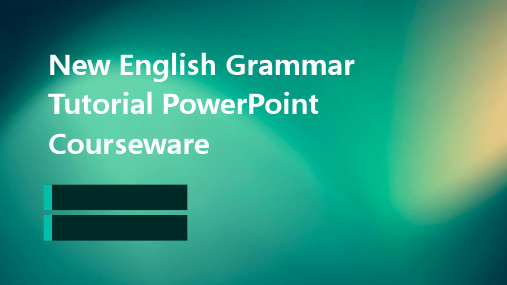
Modifier
a word or phrase that describes or limits the meaning of another word in a sense
Sense and voice
Sense
indicates when an action or state occurs (past, present, or future)
Introduce clauses that modify nouns or pronouns (e.g., "who," "which," "that")
Used to ask questions about nouns or pronouns (e.g., "who," "what," "which")
Voice
indicates which subject of the presence performs the action (active voice) or receives the action (passive voice)
Subjunctive mood
Subjunctive mood
03 Nouns and Pronouns
Types and Usage of Nouns
Generic names for people, places, or things (e.g., "dog,"
"city")
Co mm on No uns
Refer to ideas, concepts, or qualities
Background
a word or phrase that describes or limits the meaning of another word in a sense
Sense and voice
Sense
indicates when an action or state occurs (past, present, or future)
Introduce clauses that modify nouns or pronouns (e.g., "who," "which," "that")
Used to ask questions about nouns or pronouns (e.g., "who," "what," "which")
Voice
indicates which subject of the presence performs the action (active voice) or receives the action (passive voice)
Subjunctive mood
Subjunctive mood
03 Nouns and Pronouns
Types and Usage of Nouns
Generic names for people, places, or things (e.g., "dog,"
"city")
Co mm on No uns
Refer to ideas, concepts, or qualities
Background
英语语法讲解课件-状语从句 ppt课件

ppt课件 10
ppt课件
11
状语从句分类
1. 2. 3. 4. 5. 6. 7. 8. 表示时间 表示地点 表示原因 表示结果 表示目的 表示条件 表示让步 表示比较
ppt课件 12
表示时间
一、时间状语从句 • When, as ,while, • before, after, • till, Until, • as soon as, • The moment, the minute, the first time…. (名词性短语)
ppt课件 21
E.G. 1. He was so angry that he left the room without a word. 他很生气,一句话不说就离开 了房间。 2. It is such a heavy box that nobody can move it. 3. The box is so heavy that nobody can move it. 4. The box is so heavy as nobody can move . 5. I didn’t go early, so that I didn’t get a seat.
ppt课件
30
表示比较
八、比较状语从句
主要由 • than, • as...as, • the more…the more • 这类从句常常有一些成分没有表示出来:
ppt课件 31
E.G.
• The more you eat, the fatter you are. • John is less clever than Tom. • He is not so/as clever as his brother.
ppt课件
ppt课件
11
状语从句分类
1. 2. 3. 4. 5. 6. 7. 8. 表示时间 表示地点 表示原因 表示结果 表示目的 表示条件 表示让步 表示比较
ppt课件 12
表示时间
一、时间状语从句 • When, as ,while, • before, after, • till, Until, • as soon as, • The moment, the minute, the first time…. (名词性短语)
ppt课件 21
E.G. 1. He was so angry that he left the room without a word. 他很生气,一句话不说就离开 了房间。 2. It is such a heavy box that nobody can move it. 3. The box is so heavy that nobody can move it. 4. The box is so heavy as nobody can move . 5. I didn’t go early, so that I didn’t get a seat.
ppt课件
30
表示比较
八、比较状语从句
主要由 • than, • as...as, • the more…the more • 这类从句常常有一些成分没有表示出来:
ppt课件 31
E.G.
• The more you eat, the fatter you are. • John is less clever than Tom. • He is not so/as clever as his brother.
ppt课件
高中英语语法大全PPT课件
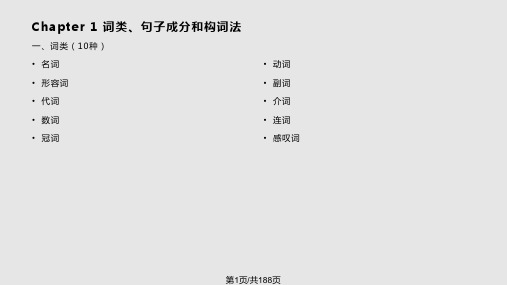
• 名词→动词 hand(手)→(传递),face(脸)→(面对)
• 形容词→副词 early→early, fast→fast
• 副词→连词 when(什么时候)→(当……时候)
• 介词→副词 in(到……里)→(在里面;在家),on(在…上)→(进行,继续),
第6页/共188页
Chapter 2 名词
• 专有名词 Beijing, Tom, the People’s Republic of China • 普通名词
▲可数名词 ▲不可数名词
第7页/共188页
一、英语可数名词的单复数
• 规则变化 ①在单数名词词尾加s ②s,o,x ,sh,ch结尾的词加es ③以辅音字母加y结尾的名词,变y为i,再加es ④以f或fe结尾的名词,变f或fe为v,再加es。
第15页/共188页
主主格格 宾宾格格
第第一一人人 称称单单数数
第第二二人人 称称单单数数
第第三三人人称称单单数数
男男
女女
II
YYoouu hhee
sshhee
((我我))
((你你))
((他他))
((她她))
mmee
yyoouu
hhiimm
hheerr
((我我))
((你你))
((他他))
((她她))
语或者表语,后面千万不可以跟名词 eg. This is your cup,but where is mine?(这是你的杯子,可我的在哪儿?) • 双重所有格:“of + 名词性物主代词”
第18页/共188页
第一人 第二人 称单数 称单数
第三人称单数
男
女
中性
第一人 第二人 第三人 称复 称复数 称复数 数
• 形容词→副词 early→early, fast→fast
• 副词→连词 when(什么时候)→(当……时候)
• 介词→副词 in(到……里)→(在里面;在家),on(在…上)→(进行,继续),
第6页/共188页
Chapter 2 名词
• 专有名词 Beijing, Tom, the People’s Republic of China • 普通名词
▲可数名词 ▲不可数名词
第7页/共188页
一、英语可数名词的单复数
• 规则变化 ①在单数名词词尾加s ②s,o,x ,sh,ch结尾的词加es ③以辅音字母加y结尾的名词,变y为i,再加es ④以f或fe结尾的名词,变f或fe为v,再加es。
第15页/共188页
主主格格 宾宾格格
第第一一人人 称称单单数数
第第二二人人 称称单单数数
第第三三人人称称单单数数
男男
女女
II
YYoouu hhee
sshhee
((我我))
((你你))
((他他))
((她她))
mmee
yyoouu
hhiimm
hheerr
((我我))
((你你))
((他他))
((她她))
语或者表语,后面千万不可以跟名词 eg. This is your cup,but where is mine?(这是你的杯子,可我的在哪儿?) • 双重所有格:“of + 名词性物主代词”
第18页/共188页
第一人 第二人 称单数 称单数
第三人称单数
男
女
中性
第一人 第二人 第三人 称复 称复数 称复数 数
大学英语语法PPT(全)
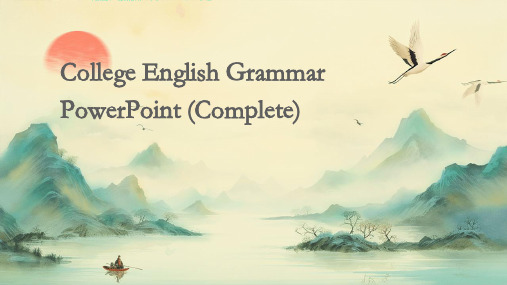
Plural nouns
02
referring to more than one thing, e.g., "cats", "books"
Zero plural
03
referring to a group of things without a plural form, e.g.,
"people", "fish"
They
used as the subject or object of a verb to express a group of people, or in place of a subject pronoun when the gender is unknown or insignificant.
The possessive case of nouns
Formation
adding "-'s" or "'s" to the end of the noun, e.g., "cat's", "dog's"
Usage
indicating ownership or possession, e.g., "the cat's food", "my brother's car"
used as the subject or object of a verb to express any person, thing, or idea without specifying which one.
used as the subject or object of a verb to express every single person, thing, or idea in a group without exception.
大学英语语法ppt课件

Conjunction
Conjunction refers to a word used to connect two or more sentences or components of a sentence.
Conjunctions are commonly used to connect two or more sentences or
Comparative and Superlative
Some advertisements have comparative and superlative forms that express degrees of comparison
Comparative and Superlative
Definition
College English Grammar PPT Courseware
目录
• Introduction • Noun • Verb • Subjects and advertisements • Positions and connections • Subordinate clause • Non fine verbs • Subjunctive mood
Common types of advertisements include banner, time, place, degree, and frequency advertisements
Placement
Advantageously come after the subject and before the verb in simple intentions
01
Introduction
Course Introduction
基本英语语法大全PPT课件PPT42页

各时态中的
“四大基本句型”
.
1第2页,共42页。
什么是四大基本句型
1 主动句型:主语+谓语(动词或 动词短语)
I study. We listen to the music. She takes care of her baby.
.
2第3页,共42页。
2 被动句型:主语+谓语( Be的过去分词)
I am thirsty.
My father is an engineer.
It will be cloudy tomorrow.
He has been in Beijing.
.
21第22页,共42页。
2变得:get, turn, grow, go, fall, become, come
He got angry. The leaves have turned red. The man has grown old. It never goes wrong. She soon fell asleep. My dream has come true.
一、时态的定义:时间+状态 二、时态的划分方法: 三、对四个时间段和四种状态的定义 时间分为:现在,过去,将来,过去将来。 状态分为:一般,进行,完成,完成进行。共 组合16种时态,其中8种是常用的。
.
23第24页,共42页。
感官联系动词:看起来, 听上去,闻 起来, 尝起来,摸起来,看来,显得 等等。
You look great.
His advice sounds reasonable.
The cheese smelled terrible.
The table feels smooth.
“四大基本句型”
.
1第2页,共42页。
什么是四大基本句型
1 主动句型:主语+谓语(动词或 动词短语)
I study. We listen to the music. She takes care of her baby.
.
2第3页,共42页。
2 被动句型:主语+谓语( Be的过去分词)
I am thirsty.
My father is an engineer.
It will be cloudy tomorrow.
He has been in Beijing.
.
21第22页,共42页。
2变得:get, turn, grow, go, fall, become, come
He got angry. The leaves have turned red. The man has grown old. It never goes wrong. She soon fell asleep. My dream has come true.
一、时态的定义:时间+状态 二、时态的划分方法: 三、对四个时间段和四种状态的定义 时间分为:现在,过去,将来,过去将来。 状态分为:一般,进行,完成,完成进行。共 组合16种时态,其中8种是常用的。
.
23第24页,共42页。
感官联系动词:看起来, 听上去,闻 起来, 尝起来,摸起来,看来,显得 等等。
You look great.
His advice sounds reasonable.
The cheese smelled terrible.
The table feels smooth.
英语语法-动词不定式PPT课件

-Yes. I think that’s 2 years ago.
√ a. sfeoerget/br.esmeeeimngberct.otodoseseth.
d. saw
forget/remember doing sth.
stop/go on to do sth
stop/go on doing sth
宾语
4. People eat to live, but not live to eat.
5. I have a lot to tell you.
6.
定语 It’s not right to be always thinking of oneself.
7. We often see him play football.
(目的) (目的)
(结果)
第5页/共22页
4.用作主语(这时可将其用形式主语it来替换) 1.To be an actress is my dream. It is my dream to be an actress. 2. To go abroad is his dream. It is his dream to go abroad. 3. To say is easy, to do is difficult. It is easy to say, it is difficult to do.
todo表示目的doctordidwhathecoulddo作定语如是不及物动词构成不定式短语作定语其后需接介词第21页共22页感谢您的观看
动词不定式的基本形式是“to+动词原形 “,有时可以不带to.
动词不定式没有人称和数的变化,在句子中 不能作谓语。在句中可以作主语、表语、宾 语、宾语补足语、定语和状语。
英语语法讲解ppt课件
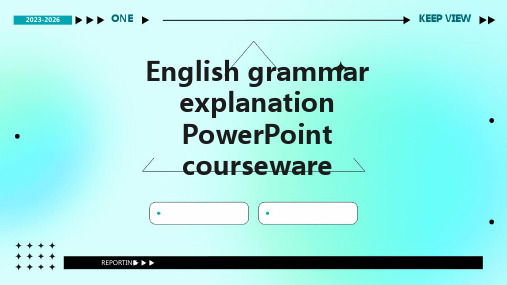
Sentence structure
Learning how to construct simple, complex, and complex senses using appropriate subject verb agreement, tense, and punctation
Phrases and claims
Passive voice composition and
"Subject+Auxiliary Verb+Past Article
The basic structure that forms the passive voice, such as" The cake was eaten by the dog. ""
PART 03
Verb Tense and Voice
Types and usage of verb tensions
Present Tense
Describe the current action or state of existence, such as "I eat an apple."
Identifying and using phrases (non phrases, verb phrases, objective phrases, alternative phrases) and claims (independent and dependent clauses) to create variety and complexity in writing
Past Tense
Describe past actions or states of existence, such as "She walked to the park."
Learning how to construct simple, complex, and complex senses using appropriate subject verb agreement, tense, and punctation
Phrases and claims
Passive voice composition and
"Subject+Auxiliary Verb+Past Article
The basic structure that forms the passive voice, such as" The cake was eaten by the dog. ""
PART 03
Verb Tense and Voice
Types and usage of verb tensions
Present Tense
Describe the current action or state of existence, such as "I eat an apple."
Identifying and using phrases (non phrases, verb phrases, objective phrases, alternative phrases) and claims (independent and dependent clauses) to create variety and complexity in writing
Past Tense
Describe past actions or states of existence, such as "She walked to the park."
《英语语法大全》PPT课件

04
(6)介词—副词 ,如:in(到……里)—(在里面;在家 ),on(在…上)—(进行 ,继续),等等
05
谢谢
2、派生法:
1)派生名词:
●动词 +er/or
●动词 +ing
●动词 +(t)ion
●形容词 +ness
●其他 ,如:inventor
learner swimming congratulation kindness
carelessness knowledge
2)派生形容词:
●Chinese; Japanese
07lish
●French
●German
●名词 +y
02
03
01
04
05
●名词 +ful
●dangerous
●动词 +ing/ed
●friendly
●国名 +(i)an 如:snowy sunny hopeful beautiful interesting following
daily(每日的 ) nervous delicious
7、宾语补足语 用来说明宾语怎么样或干什么 ,通常由形容词或动词充当。
如:They usually keep their classroom clean.
他们通常让教室保持清洁。
He often helps me do my lessons.
他常常帮我做功课。
The teacher wanted me to learn French all by myself.
如:He can spell the word.(他能拼这个词 )
有些及物动词带有两个宾语,一个指物 ,一个指人。指物的叫直接宾语,指人的叫间接宾语。间接宾语一般放在直接宾语的前面。 如:He wrote me a letter . (他给我写了一封信 )
(6)介词—副词 ,如:in(到……里)—(在里面;在家 ),on(在…上)—(进行 ,继续),等等
05
谢谢
2、派生法:
1)派生名词:
●动词 +er/or
●动词 +ing
●动词 +(t)ion
●形容词 +ness
●其他 ,如:inventor
learner swimming congratulation kindness
carelessness knowledge
2)派生形容词:
●Chinese; Japanese
07lish
●French
●German
●名词 +y
02
03
01
04
05
●名词 +ful
●dangerous
●动词 +ing/ed
●friendly
●国名 +(i)an 如:snowy sunny hopeful beautiful interesting following
daily(每日的 ) nervous delicious
7、宾语补足语 用来说明宾语怎么样或干什么 ,通常由形容词或动词充当。
如:They usually keep their classroom clean.
他们通常让教室保持清洁。
He often helps me do my lessons.
他常常帮我做功课。
The teacher wanted me to learn French all by myself.
如:He can spell the word.(他能拼这个词 )
有些及物动词带有两个宾语,一个指物 ,一个指人。指物的叫直接宾语,指人的叫间接宾语。间接宾语一般放在直接宾语的前面。 如:He wrote me a letter . (他给我写了一封信 )
英语语法名词ppt课件

Ⅰ 用括号中所给词的适当形式填空:
1.The two girls are Japanese ( Japan ) . 2. The babies ( baby ) are asleep .
3. Do you know the twmoen teacher(sman teacher ) ?
4.
children The ( child
d. 以复数形式出现的书名,剧名,报纸,杂志名, 也可视为单数。 "The Arabian Nights" is a very interesting story-book. <<一千零一夜>> 是一本非常有趣的故事书。
[ 典型题例分析 ]
例1 下列几组复数名词中,每组都有一个错词,请指出: 1. A.Chinese B. Frenchmen C. Englishmen D. Germen 2. A. tomatoes B. photos C. radioes D. potatoes 3. A. desks B. Americans C. friends D. breads 4. A. leaves B. knives C. rooves D. shelves
3、以辅音字母加y结尾的 , 先变y为i , 再加-es ;
如: baby-babies ,family-families, city-cities study-studies 书房
4、以f,fe结尾的名词,通常要变f 或fe为v,再加- es; 如: leaf-leaves, wife---wives,life---lives, thief---thieves;
the
.
A. farm
B. post office
《英语语法大全》PPT课件
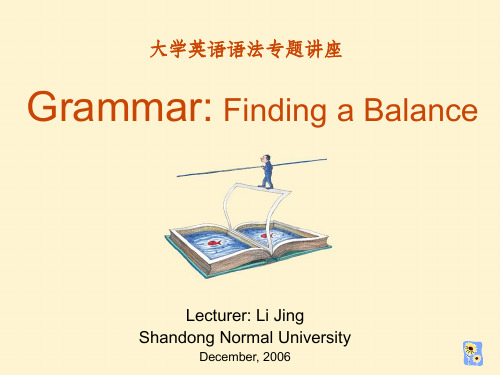
I’m thank you all the same.(画蛇添足) Please sent it to me. I must to learn the book.
---
不要眼高手低
I was at the point of telephoning him when his letter arrived.
● To gain a balanced view of grammar study, recognize the importance of accuracy in language use.
正确对待语法学习,认识到准确使用语言的重要性.
● To acquire both knowledge of grammatical forms and skill in using the forms.
---
语法与读写
One day, a lion named Jack was sleeping beside a tall tree. Just then, Jim, a cat, walk towards the lion, woke him up with a light pat and said: “Why don’t we have a game?” “Uh, that’s a great idea. But what can I benefit from it?” “A delicious meal.” “OK.” Nodded the lion. Jack stand up and walk towards the forest. They then saw a crowd of pigs playing together. The cat whispered: “Go and see who will be the first one to catch them.” Jack rushed out at once and catch a small unlucky pig. “Ha Ha, I win the game!” “Don’t be so eager. Now let’s see who can climb the tree with that meat.” With those words, the cat grabbed the meat and climbed to the top. The lion struggled to climbˇ the tree but he failed. “We have a tie, Jim. And what’s the next?” “Ha ha, the next stage is who can enjoy the meat as quickly as possible!” laughed Jim.
---
不要眼高手低
I was at the point of telephoning him when his letter arrived.
● To gain a balanced view of grammar study, recognize the importance of accuracy in language use.
正确对待语法学习,认识到准确使用语言的重要性.
● To acquire both knowledge of grammatical forms and skill in using the forms.
---
语法与读写
One day, a lion named Jack was sleeping beside a tall tree. Just then, Jim, a cat, walk towards the lion, woke him up with a light pat and said: “Why don’t we have a game?” “Uh, that’s a great idea. But what can I benefit from it?” “A delicious meal.” “OK.” Nodded the lion. Jack stand up and walk towards the forest. They then saw a crowd of pigs playing together. The cat whispered: “Go and see who will be the first one to catch them.” Jack rushed out at once and catch a small unlucky pig. “Ha Ha, I win the game!” “Don’t be so eager. Now let’s see who can climb the tree with that meat.” With those words, the cat grabbed the meat and climbed to the top. The lion struggled to climbˇ the tree but he failed. “We have a tie, Jim. And what’s the next?” “Ha ha, the next stage is who can enjoy the meat as quickly as possible!” laughed Jim.
初中英语语法PPT课件

• 跟不定式作宾补的动词是: • (1)劝教命请叫:advise,teach,order, command,ask,tell。 • (2)允许又警告:allow,permit,warn。 • (3)使役帮想望:cause,let,have, make,help,get,wish,want,expect。 • (4)知觉全部上:feel,hear,watch, see,observe,notice。
初中英语语法
第一章 词类与句子的
• 1.陈述句变疑问句口诀: • “是,情,助”,移向前,主语让步往后缩,现 在过去do来变,谓语只把原形现,最后莫忘问号 点。 • 2.对划线部分提问的程序: • 一代(用疑问词代替划线部分) • 二移(把疑问词移至句首) • 三倒(颠倒主谓语,但对主语提问时除外) • 四抄(照抄其他部分)
• • • • •
• (3)当人称代词在句子中作宾语随后又有-ing作 补语,人称代词只能用宾语不用属格。 • They caught him cheating on the exam.(not his) 他们抓着他在考试中作弊。 • (4)在anyone/no one but之后可用第一二人称 反身代词作主语,却不用第三人称反身代词。 • Anyone but yourself would have noticed the change.除你本人外大家都注意到了变化。 • Nobody but myself noticed the change.除我自己 再没人注意到变化。 • *Nobody but himself noticed the change. • 应该说: • Nobody but he himself noticed the change.除他 自己再没人注意到变化。
- 1、下载文档前请自行甄别文档内容的完整性,平台不提供额外的编辑、内容补充、找答案等附加服务。
- 2、"仅部分预览"的文档,不可在线预览部分如存在完整性等问题,可反馈申请退款(可完整预览的文档不适用该条件!)。
- 3、如文档侵犯您的权益,请联系客服反馈,我们会尽快为您处理(人工客服工作时间:9:00-18:30)。
三、用于as if,as though等引起的状 语从句
1.与现在的事实不符,用一般过去式 2.与过去的事实不符,用had+过去分词 He often treats me as if I _____(be) a
child. Peter talked as if he _____(be) there
really.
四、用于表示要求、建议、命令等意义的词后的各 种从句,谓语用should+动词原形,should 可省略
动词 suggest, advise, demand ,require, request, order ,command, insist
名词 advice, suggestion, demand, requirement, request, order, command, insistence
If you missed the chance, you _____(feel) sorry for it.
If I ________(be) more careful, I would not have made so many silly mistakes.
一.用于if引起的非实的条件句
more than 1000 yuan each month ____(have) pay income taxes. What ______(happen) if you did not observe the traffic rules?
一.用于if引起的非真实的条件句
1)与现在事实相反的假设,从句的谓语动词 用一般过去时(be 的过去式是were),主句的 谓语动词用would(should, could, might)+动词原 2形)与过去事实相反的假设,从句的谓语动词 用“had+过去分词”,主句用“would(should , could, might)+have+过去分词
trip. His suggestion is that we _____ (go) out on
picnic next Sunday
五、用于其他各种从句
1.用于主语从句,It’s important, natural , necessary, essential +主语从句(谓语动词用 should+动词原形)
二、用于wish后宾语从句
1)表示与现在的愿望相反,谓语动词用 一般过去式
2)表示与过去的愿望相反,谓语动词用 “had+过去分词 ”
3)表示与将来的愿望相反,谓语动词用 “would(could,might)+动词原形
I wish I ____(be) young forever. I wish I ______(tell )him the news.
形容词advisable, desired, demanded, ordered, required, suggested
Example
He insisted that we ____(be) in his office at six.
It’s required that the machine___(be)tested. The doctor suggested that she ____(take)a
3)与将来发生的事实可能相反的假设,从 句的谓语动词用一般过去时、should(were to) +动词原形,主句用“would (should, could, might)+动词原形
Example
The spaceship would burn up if it ____(go) to close to the star.
4. He took his umbrella with him in case it ____(rain).
2.用于It is (high) time 所引起的定语从句(谓语 动词用一般过去式)
3.用于would rather, would prefer等引起的状语 从句
1)与过去事实相反,谓语动词用had+动词原形 2)与现在事实相反,谓语动词用一般过去式 用于lest, in case引起的状语从句,谓语动词
用”should+动词原形”, should 不可以省.
Example
1. It’s high time we ____( go) back to college.
2. I would rather you _____(not tell ) him anything about it.
3. She would prefer that she ______(not stay) at home last night.
Grammar : Subjunctive Mood
Example Isn’t it high time we_____ (live)
responsibly, with our nation’s future time. It’s required that anyone who has earned
4)条件句中的连词if可省略,但从句要倒装, 即将were, had, should 等置于主语前.
5)有些条件句不用if引出,而用without, but 等引出
But for the rain, we _______(go) down to the country.
_____(be) he here this afternoon, I would go with him.
